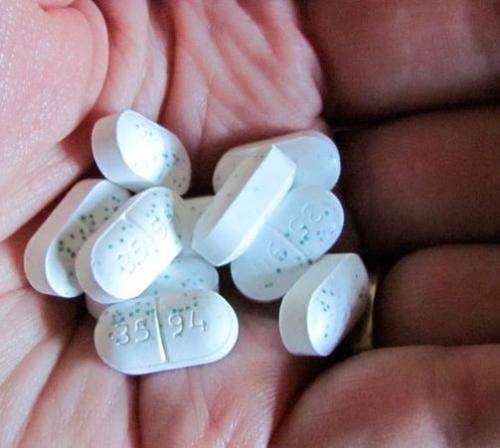July 1, 2015 report
Researchers find using genetic association data applied to drug target selection could significantly boost success rate

(Medical Xpress)—A team of researchers with member affiliations to institutions in the U.S. and Hong Kong, has found that researchers going after drug targets that have supporting genetic evidence could double the success rate of new drugs making it through clinical trials. In their paper published in the journal Nature Genetics, the team describes how they correlated data from gene associated disease databases to drug development databases to find commonalities.
Developing new drugs to treat diseases is a risky venture—currently approximately half of those approved for clinical trials fail to deliver on expectations. Because a lot of time and effort goes into drug development, those that fail can represent a significant loss. Finding a way to improve the odds would help both the bottom line of drug developers and the human beings who eventually benefit from the drugs that pass through the system. In this new effort, the researchers believe they have found a way to do just that—by taking into consideration gene associations as part of pursuing a given target.
The team accessed data from GWASdb—where information about common diseases with a genetic cause is stored, along with data from the Online Mendelian Inheritance in Man database—it houses more rare genetically based diseases. After mapping that data to Medical Subject Heading, they came up with a group of 16,459 gene and trait combinations. Next, they pulled data from the Informa Pharmaprojects database, which houses information about drugs making their way from research to use by patients. Finally, they set a benchmark of a successful drug to mean one that passed clinical trials and was okayed for use in the U.S. or European Union.
In looking at the connection between gene associations and drug targeting, they found that those drugs that were a success more often targeted genes with evidence of association to a disease. So strong were their results that the team is claiming that using their approach could double the success rate of drugs under consideration. They noted too that using such associations proved to be more advantageous with some genetically based disease than with others and that the improved rate varied depending on the phase of the clinical trial.
More information: The support of human genetic evidence for approved drug indications, Nature Genetics (2015) DOI: 10.1038/ng.3314
Abstract
Over a quarter of drugs that enter clinical development fail because they are ineffective. Growing insight into genes that influence human disease may affect how drug targets and indications are selected. However, there is little guidance about how much weight should be given to genetic evidence in making these key decisions. To answer this question, we investigated how well the current archive of genetic evidence predicts drug mechanisms. We found that, among well-studied indications, the proportion of drug mechanisms with direct genetic support increases significantly across the drug development pipeline, from 2.0% at the preclinical stage to 8.2% among mechanisms for approved drugs, and varies dramatically among disease areas. We estimate that selecting genetically supported targets could double the success rate in clinical development. Therefore, using the growing wealth of human genetic data to select the best targets and indications should have a measurable impact on the successful development of new drugs.
© 2015 Medical Xpress


















